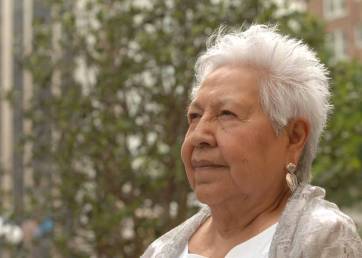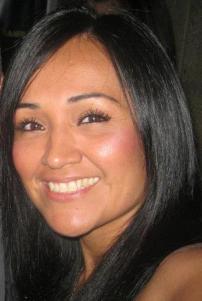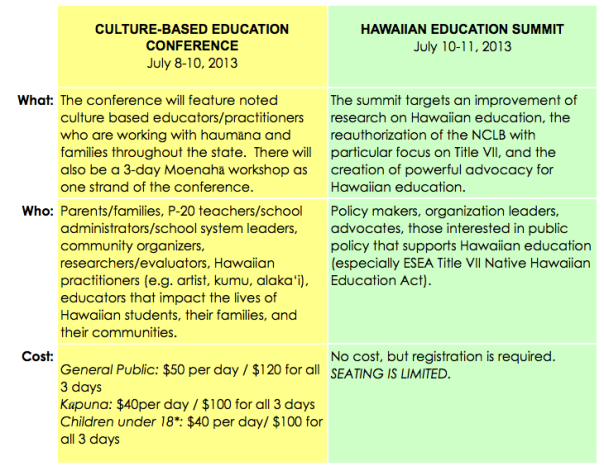“Where Indigenous peoples are in educational crisis, Indigenous educators must be trained to be change agents whose primary task is the transformation of undesirable circumstances. They must develop radical pedagogy that is informed by their cultural preferences and by their own critical circumstances. They must be taught about the importance of reflecting on and questioning their work.” -Graham Smith
Author Archives: malukido
Kuleana
Kaimana Cabebe speaking about kuleana at the Engaging Communities in Education and Community Learning Exchange conference in Honolulu, Hawaiʻi. This conference was hosted by Hawaiʻinuiākea School of Hawaiian Knowledge. This video was shot and produced by the evaluation team.
This video is a good reminder of the importance of language and worldview. Mahalo, e Kaimana.
ECE CLE – Kuleana Eval from EduTrope on Vimeo.
Henrietta Mann
Henrietta Mann
2) Please identify your ethnic background(s).
Tsistsistas (Cheyenne) enrolled with the Cheyenne and Arapaho Tribes of Oklahoma
3) What is your current position or occupation?
President, Cheyenne and Arapaho Tribal College
4) What does Indigenous education mean to you?
It means a study of the life ways of the “natural, ordinary people of the land,” those that were first to live with the land that continues to give them life and an identity.
5) How does Indigenous education relate to the work you do?
I have the pleasure and sacred trust of the people in helping them pass down their unique and beautiful ways to the younger ones, in the ways of our ancestors and also utilizing the current systems available to them.
6) When did you first get involved with Indigenous education? And, what sparked your involvement?
Education was a childhood dream and it was usual for my older “cousins” and me to “play school” as a child of four/five years of age. They would role play their teachers and teach what they had learned that day. They made it fun! Thus, they helped to inspire my love of learning.
7) Please explain your interests related to Indigenous education.
My paramount interest is to continue to study our language(s) and to pass language on, to be particularly cognizant that I do not want my generation to be the one that loses our divine language given at creation. Furthermore, this study of languages has to involve culture, which is an interplay between the two.
8) What are your goals related to Indigenous education?
-Keep the Cheyenne and the Arapaho languages alive.
-Pass on the knowledge of our respective cultural ways.
-Ensure that tribal histories remain alive.
-Educate students to live in a contemporary multicultural world
9) Are there any projects you’re currently working on? What are they?
1. The tribal college offers a summer Ethnographic Filmmaking class with the City College of New York.
2. The tribal college participates in an annual Teachers’ Workshop along with the National Park Service and Cheyenne and Arapaho Department of Education.
10) Please share any notable experiences that you may have had as an Indigenous student or scholar. These experiences may be positive or negative.
I graduated with a Bachelor’s Degree in 1954 and back then I was virtually alone as a student of color. It was lonely, but I was also conscious of the need for an education. I ultimately completed a Master’s level degree, and finally a Doctor of Philosophy Degree in American Studies in 1982. It was a long journey but I was determined to set a standard at least for people who shared my goal. I have had a long and good ride in indigenous education and would not trade the experience for anything.
11) Please share any advice that may be helpful for the next generation of Indigenous scholars.
Never give up for indigenous scholars represent the hopes and dreams of the ancestors and our very continuity as indigenous peoples.
12) Please share any other thoughts regarding Indigenous education and/or your journey.
On the one hand, indigenous scholars have to recognize their ancestors’ long involvement in education. On the other hand, they have to acknowledge the task of catching up in mainstream educational settings.
Charene T. Alexander
Kees Kees I Blu (Indian Name)
Charene T. Alexander. I am the daughter of Alice Jefferson and Francis Alexander, and grand daughter of Lillian Solomon and Douglas Jefferson; Florence Henry and Maurice Alexander.
2) Please identify your ethnic background(s).
I am Coast Salish Native American of the Lummi Nation, Washington. Descendant of Skagit, Squamish and Duwamish Nations as well.
3) What is your current position or occupation?
My occupation is as Project Development Specialist, Xwle’lemes (Restorative Justice) Department of the Lummi Indian Business Council (LIBC). Also, I am currently appointed to Northwest Indian College (NWIC) Board of Trustees, Member.
4) What does Indigenous education mean to you?
Indigenous education promotes and sustains thriving Native communities in culture, social and economic abundance. To me indigenous education, generally speaking, means the way of life as a Native American. It means continually learning who I am, as a Coast Salish Native American, by learning and abiding by the teachings of my ancestors and elders to exemplify the values of our Lummi people and our way of life. I do this by practicing our traditions, customs and honoring the values of our people; past, present and future generations. Our ancestors understood the importance of securing future pathways (education, health care, language, land and water rights etc.,) to sustain our way of life. It is a privilege to witness education embrace and celebrate the diversity of indigenous nations that contribute to community development and sustainability.
5) How does Indigenous education relate to the work you do?
Indigenous education embraces the values of our people that we see in our governing body, organizational systems and individual lives either through individual prosperity or our tribal sovereignty. While I value my certificates and degree achieved from academic institutions, I am always reminded that education is not only found in an institution or classroom. Indigenous education relates to my occupation as Project Development Specialist, Xwle’lemes Department, and is actually the center of our work as we receive and develop traditional justice services guided by the stories and teaching of our elders and our people, to promote healthy and constructive resolutions, and traditional alternatives to the western court process.
As a NWIC Board of Trustees Member, I am part of the governing body that is responsible for the operation and management of the College. NWIC, through education, promotes indigenous self-determination and knowledge.
6) When did you first get involved with Indigenous education? And, what sparked your involvement?
My involvement began as a child, the teachings of our people instilled a quest to learn and understand how to help create and sustain positive changes for our people and tribal nations. I was taught in order to do so; it must begin within my family. So I began with myself. I listened to my elders, leaders and parents when they shared their advice and wisdom to love my people, help my people, keep good company, and honor our values and traditions and to do so while accomplishing a higher education. Than to contribute my knowledge and experience back to the people. So it was no surprise that I wound up being a first generation Human Services graduate and later employed in social work and social justice occupations and currently a servant to and for post-secondary education.
7) Please explain your interests related to Indigenous education.
My interests related to Indigenous education are to carry on helping the next generations just as my ancestors have for me. I look forward to being a part of Nation building for our indigenous peoples. It is my hope that through my efforts my son, his children and his children’s children are afforded an education and way of life about who they are. I believe life’s journey is learning and knowing your role and purpose. Once our children learn their role and purpose our tribal nations become stronger and richer. Opportunities afforded through Indigenous education lay a solid foundation of our living values as indigenous peoples, creating future scholars, change agents, leaders, nation builders, and life long learners.
8) What are your goals related to Indigenous education?
I intended to continue my own post-secondary education that contribute and assist my tribal community and other Native Nations alike. I plan to continue advocating for indigenous education and our place within the education arena, with the voices of my ancestors and the shoulders of those whom I stand upon as my guide to always support and protect our self-determination, culture, knowledge and sovereignty.
9) Are there any projects you’re currently working on? What are they?
Xwle’lemes Department is a developing department so we are currently working to develop our program of services offered to our tribal members that are based on our Lummi “way of life,” culture and tradition that seek resolution, inclusion, partnership, responsibility, forgiveness by putting the family and community first.
10) Please share any notable experiences that you may have had as an Indigenous student or scholar. These experiences may be positive or negative.
I believe that overall my experience as a indigenous student was finding, recognizing and using my voice to advocate for equality for indigenous peoples and also realizing how significant and vast the inequalities actually. I gradually realized the significance and importance in becoming a global thinker and also a visionary so that I may continually find the strength, wisdom and knowledge to help change such disparities upon indigenous nations.
11) Please share any advice that may be helpful for the next generation of Indigenous scholars.
Work hardest on learning, knowing and ‘growing’ you. Trust me; your Nation will be richer because of it. The most important work that you will ever do is not in the community, classroom or even in an office. It is in your very own home. If you are doing the work necessary in your home abundance is created, and that abundance will flow into the community, classrooms and work place, hence your Indigenous Nation. In advance, to the next indigenous scholars I thank you for all of your dedication, sacrifice and contribution to all of the indigenous nations!
Change Agents
Apply; Do
“Knowing is not enough; we must apply. Willing is not enough; we must do.” -Johann Wolfgang Von Goethe
Lorax
“Unless someone like you cares a whole awful lot, nothing is going to get better. It’s not.” -The Lorax
Culture-Based Education Conference & Hawaiian Education Summit 2013
Aloha hou kākou,
I wanted to post a great opportunity for those interested in cultural-based education and Hawaiian education. Kamehameha Schools will be hosting a conference and summit this coming week. The conference will be held from July 8-10, and the summit will be held from July 10-11. Please take a look at their website for more information: http://extension.ksbe.edu/cbeconference/
Unfortunately, I will be in New York at the time, so I am unable to attend. If anyone has anything to report on the conference or summit, please share your manaʻo below!
Importance of Moʻolelo
Aloha mai!
Throughout my own experiences in Indigenous education, I have come to the understanding that there is an importance to capture the moʻolelo (stories) of our elders and youth. There is a necessity to capture these stories in order to understand, revitalize, and grow from the experiences of our people. Since the beginning of our existences, the art of storytelling was a critical vehicle for learning and teaching. This form of education has allowed us to sustain our cultures and people for thousands of years. It has kept our sacred knowledge safe throughout all of the triumphs and struggles that our people faced. These stories are our moʻokūʻauhau (genealogies) of our families, our people, and our culture. These moʻolelo tell us who we are and set the path of who we may be. In the succession of these stories, we understand and learn about the past, present, and future.
The moʻo (succession/lineage) relates very closely to education. We see the moʻokūʻauhau within the academy, and it is valuable to learn from the experiences of our predecessors. By capturing their stories, we are able to strengthen our abilities to enact change within the field of education. We will have the opportunities to learn and grow from both, their successes and mistakes. It is also important to give a voice to our youth, our next generation of Indigenous scholars. There is an undeniable power of the dreams that emerge from young people. They have the passion and motivation that the field of Indigenous education needs. It is important to mentor them so that they do not become jaded or burnt out from the uphill battles of this type of work. Perhaps, the hope of the youth will revitalize the spirits of all in Indigenous education. So, the moʻolelo of our children or next-generation scholars is important. Too often, I feel that established scholars (in all fields) are so busy with their own careers that they forget about listening to the needs of the emerging scholars. We must not ignore their struggles; we must help them. They are our future…
On this website, I will feature the moʻolelo of our people. It is my hope that their words may offer advice, inspiration, and hope for Indigenous scholars. I believe that it is important to celebrate the good work that people are doing. We must work together in order to continue the successes of the Indigenous education movement. We should never feel like we are fighting alone. So, if you would like to share your moʻolelo or know of anyone that has a great one to tell, please contact me.
Me ka haʻahaʻa,
Malu
ʻAʻohe Hana Nui Ke Alu ʻIa
Here is a wonderful write-up about the ECE/CLE conference written by a participant, Steve Stapleton.
“ʻAʻohe hana nui ke alu ʻia (No task is too big when done together by all) is the theme of our first Learning Exchange in 2013, which we are hosting with Engaging Communities in Education. This theme inspires our goal of re-imagining how our systems can align more meaningfully across similar and dissimilar organizations in and across our local communities, and across both geographical and philosophical boundaries. Embedded in native Hawaiian culture for the weekend, we will honor our own cultures, histories, spirits, and connection to place in order to build strong relationships capable of sustaining our communities. Throughout the Learning Exchange we will look to these roots when we explore how to create more innovative systems to support and engage families and children. We will weave our work together so we can support stronger infrastructure that builds stronger and healthier families. We will consider how our collective efforts bring together cultural and market systems to create social enterprise and entrepreneurialism. In the end, our work together will assist us to create cutting-edge, innovative collective endeavors that form culturally grounded, systemic and sustained systems that support our families and children.”
Mahalo, Steve! To find out more about the Community Learning Exchange, please see their website, http://www.communitylearningexchange.org/
Our Voices Were Heard
“Most researchers go grab data and interpret it themselves. But, we interpreted our own data. Our voices were heard.” -Matt Militello, Associate Professor at North Carolina State University (ECE/CLE Conference, 2013)


